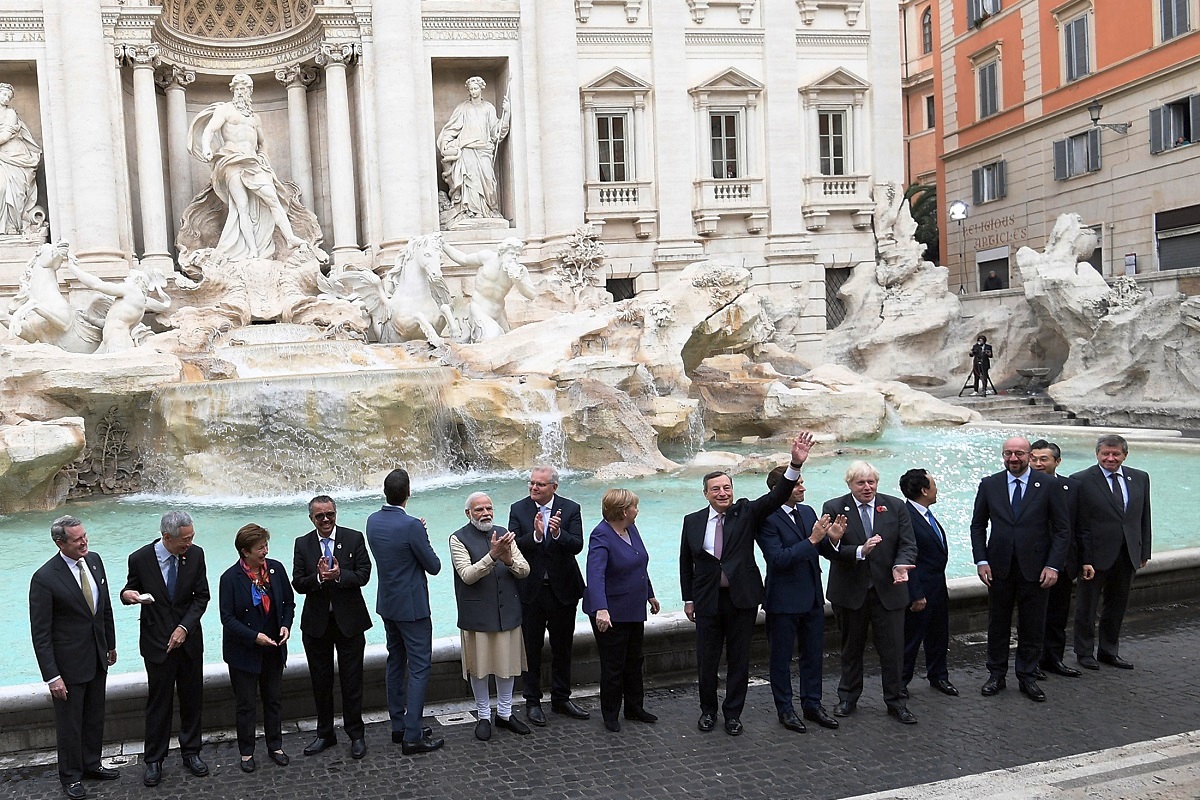Ethanol Ambitions
The Global Biofuel Alliance, announced at the G20 summit on 9 September 2023 in New Delhi, has the potential to generate opportunities worth billions of US dollars in the coming years.
The G20 bloc, which includes India, Brazil, China, Germany and the United States of America, accounts for an estimated 80 per cent of global gas emissions.

Prime Minister Narendra Modi with other G20 leaders during tossing coins into the Trevi Fountain, in Rome on Sunday. Legend says if people throw a coin here, they will return to Rome. (ANI Photo)
If the G20 summit in Rome is billed as a curtainraiser to the impending climate change conference in Glasgow, there may be hope yet as the leaders of the world’s richest economies have agreed to pursue efforts to limit global warming with “meaningful and effective actions”.
That having been said, the agreement has stopped short of specifics with few concrete commitments. This has disappointed climate activists. Italy had hoped that firm targets would be set before the COP26 summit in Glasgow.
The hesitant approach has prompted the British Prime Minister, Boris Johnson, who is hosting COP26, to remark that national leaders’ promises without action were “starting to sound hollow”. “These commitments… are drops in a rapidly warming ocean,” he said.
Advertisement
Sunday’s final statement has of course called for “meaningful and effective action”, which ought not to be confused with “concrete and urgent action”. A striking feature of the treaty of Rome, so to speak, is that the G20 leaders agreed to end public financing for coal-fired power generation abroad. But it has set no target for phasing out coal domestically.
This is a clear approval to countries that are dependent on coal, notably China and India. Equally is it a setback for Britain which had expected firm commitments ahead of the Glasgow conference. The final statement pledges to phase out “coal power as soon as possible”, but has fixed no date. This replaces a goal set in a previous draft of the final statement, specifically to achieve this by the end of the 2030s.
The meeting in Rome will be followed up by the broader UN climate conference in Glasgow. Quite obviously, the stakes are substantial, notably the survival of low-lying countries, the impact on economic livelihood the world over, and the stability of the global financial system.
The UN Secretary-General Antonio Guterres, has succinctly summed up the mood between Rome and Glasgow. Having warned the world that it is rushing towards a climate disaster, he has now regretted that the Rome summit has neither fulfilled his hopes nor buried them.
“While I welcome the G20’s recommitment to global solutions, I leave Rome with my hopes unfulfilled; but at least they are not buried.” He has expressed the hope that the goal of 1.5 degrees Celsius will be kept alive to implement promises on finance and adaptation to people and planet. Verily the world has promises to keep and miles to go before they are fulfilled.
The G20 bloc, which includes India, Brazil, China, Germany and the United States of America, accounts for an estimated 80 per cent of global gas emissions. The Group is in a position to act with the responsibility that they have as the biggest emitters.
The national plans on how to cut emissions will, therefore, have to be strengthened. The treaty of Rome boasts no specific reference to 2050 as a date to achieve net zero carbon emissions. A halt to net zero emissions must be effected.
Advertisement